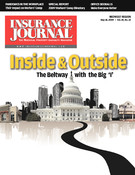Insurance agency managers could learn a lot from a beet-farming, volunteer sheriff and paper salesman like Dwight Schrute. Schrute, the character played by Rainn Wilson on NBC’s “The Office,” is an oddball whose eccentricities and awkward interactions leave his coworkers bemused and befuddled. He’s likely the kind of coworker with whom nobody would want to share a cubicle.
But if they want to succeed, they should.
That’s according to new research by a group of university professors who say that, in business, groups that include a Dwight Schrute or two tend to make better decisions. The study looked at the impact of folks known as “socially distinct newcomers” – psychology-speak for someone who is different enough to bump other team members out of their comfort zones – on traditional group problem-solving experiments. They added a newcomer to each group about five minutes into their deliberations, and when the newcomer was a social outsider, teams were more likely to solve the problem successfully.
“One of the most-cited benefits of diversity is the infusion of new ideas and perspectives,” said Katie Liljenquist, assistant professor of organizational leadership at BYU’s Marriott School of Management and one of the study’s co-authors. “While that very often is true, we found the mere presence of a newcomer who is socially distinct can really shake up the group dynamic. That leads to discomfort, but also to a better process that ultimately yields superior outcomes.”
The key factor is simply whether newcomers are distinct in some way from the other group members. “Socially ‘distinct’ doesn’t necessarily mean socially ‘inept,'” Liljenquist said. “Dwight’s upbringing and past work history – in addition to his bobblehead doll collection – all contribute to the measure of diversity he brings to ‘The Office’ melting pot.”
There are a couple of key conclusions that Liljenquist said can be drawn from the study.
One is the inherent power of outsiders. In the experiment, newcomers didn’t necessarily ask tougher questions, possess novel information or doggedly maintain a conflicting point of view. Just being there was enough to change the dynamic among old-timers who shared a common identity. When a member of the group discovered he agreed with the outsider, he felt alienated from his fellow old-timers – and he was motivated to explain his point of view on its merits so that his peers wouldn’t lump him in with the newcomer.
The second lesson has to do with the perception of effectiveness. Subjects in the experiment were members of fraternities and sororities. In general, when the newcomer was from the same sorority or fraternity as other team members, the group said it worked well together, but was less likely to correctly solve the problem. In contrast, when the newcomer belonged to a rival sorority or fraternity, the opposite was true – these groups felt they worked together less effectively, yet they significantly outperformed socially homogenous groups.
“From a self-reporting perspective, what people perceive to be beneficial turns out to be dead wrong,” Liljenquist said. “Teams that felt they worked least effectively together were ironically the top performers!”
Finding an outsider need not require hiring managers to head out to beet farms. There are common “social distinctions” in today’s workplaces that cause enough tension to fit the mold for creating better-performing groups. To help employees in those situations cope, managers would be wise to explain that such conflict can actually generate better results.
“Without that information people just assume, ‘This is really uncomfortable. My team obviously must not be working effectively,'” Liljenquist said. “If employees know that from the outset, they can better deal with inevitable conflicts and recognize the potential benefits it can translate to real performance gains.”
Was this article valuable?
Here are more articles you may enjoy.


 CFC Owners Said to Tap Banks for Sale, IPO of £5 Billion Insurer
CFC Owners Said to Tap Banks for Sale, IPO of £5 Billion Insurer  Insurify Starts App With ChatGPT to Allow Consumers to Shop for Insurance
Insurify Starts App With ChatGPT to Allow Consumers to Shop for Insurance  Viewpoint: Runoff Specialists Have Evolved Into Key Strategic Partners for Insurers
Viewpoint: Runoff Specialists Have Evolved Into Key Strategic Partners for Insurers  Insurance Broker Stocks Sink as AI App Sparks Disruption Fears
Insurance Broker Stocks Sink as AI App Sparks Disruption Fears 


